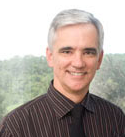Medicine, from the heart . . . James J. Ledwith
Each Thursday, the Daily Voice showcases selected Thursday Morning Memos, reflective essays about clinical experiences written by faculty, residents and alumni of the Department of Family Medicine & Community Health. Thursday Morning Memos is UMass Medical School’s homegrown version of narrative medicine, in which the authors process their experiences through writing. To learn more:http://www.umassmed.edu/news/articles/2011/personal_stories.aspx?
|
James J. Ledwith, MD, assistant professor of family medicine & community health and the residency director of the Fitchburg Family Medicine program, captures how successful patient-centered care can be, and yet how sad that success can be as well. |
 |
I feel sadly successful today. I stopped treating an illness, and cared for the patient as he had asked me to do.
My patient: a hard working technician who drove all over New England in his work. He had been lucky before we met. A small stroke essentially resolved. We met at his follow-up visit to talk about risk factor reduction as he returned to work. That opened the door to learning more about his lifestyle. He was essentially alone in the world except for his business contacts and a few cousins that he saw on holidays. Years of abusive drinking had estranged him from his ex-wife and children for decades. He was content in his life, though alone.
“Let’s talk. You’ve had one heart attack, and now a stroke. You‘ve been lucky enough to recover with no major disability. What do we do and who will I contact if something else happens?”
“If I can’t take care of myself, I don’t want to be here.” He had cousins but no proxy, and over a few more minutes of what-ifs, it was clear that if this independent man wouldn’t be able to get up and walk outdoors on his own, he wanted nothing else done to sustain his life. I was not to prolong a life of dependency. Proxy forms? He would think about it. That was June.
Fast forward eight months to another stroke. During my recent vacation, the patient suffered a devastating stroke. He received excellent, aggressive treatment appropriate for his disease, but perhaps not for his condition. His vital functions were greatly improved when I rounded on Monday morning, but he was still paralyzed and still aphasic. We continued his successful IV therapy while evaluating the situation. It is clearly a bit late to confirm and document restricted care directives when the patient is aphasic. Would he change his mind now? Is the lack of a nod a “no”? Does turning away indicate disagreement, frustration, depression, or separation from others to prepare for the end?
His cousins had a nice visit with him over the holidays. He had another brush with critical illness and fully recovered after a ruptured AAA. He told his cousins he would think about signing those proxy forms but he never did it to anyone’s knowledge. As he did with his doctor, he told his cousins that he didn’t want to be “kept alive.” Refusing a gastric tube, even refusing to eat, would be his way. If a stroke would take his independence, then it would take his life. It was the startling anticipation of our situation.
I had some very caring people who helped to sort out the situation. The ethics committee came together in less than 24 hours. It was not on paper, but he told me and he told his closest relatives. Additional IVs and gastric tubes will prolong what he saw as an agonizing existence. “It’s okay to let him go.”
In the interim, the IV therapy strengthened him and a new conversation was less one sided. He acknowledged his doctors and nurses. With nods and gestures he made it clear that he wanted us to stop all treatment. His cousins agreed, and his children, in an act of reconciliation, took part in affirming the decision. We coordinated terminal care in a nursing home. Today, less than a week after transfer, my patient’s life ended peacefully. Sadness. Success.